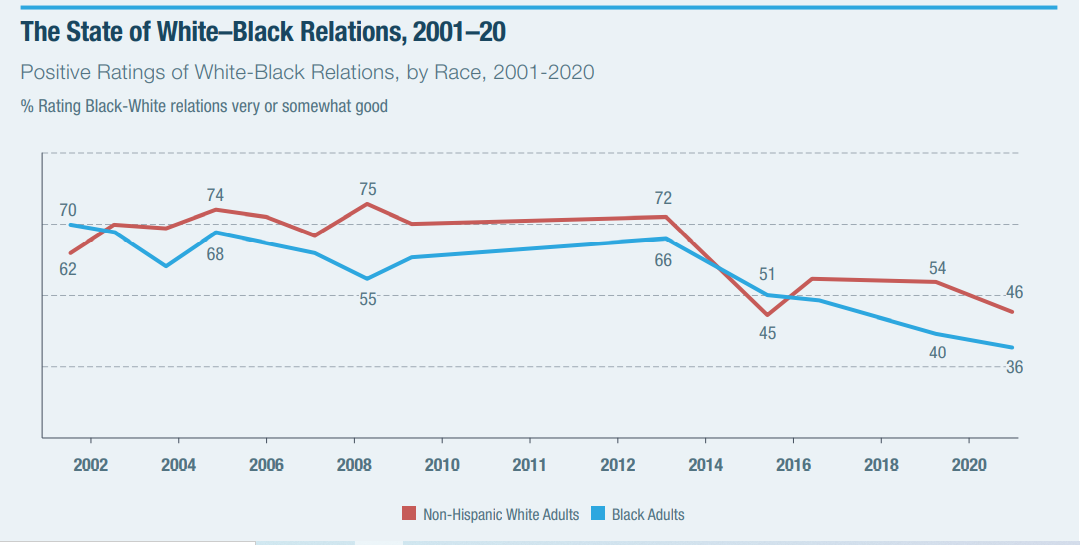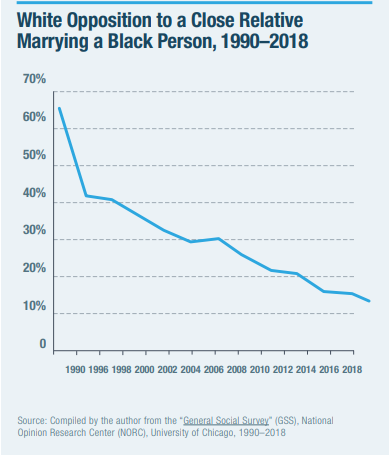Racism is Receding But Still Requires Christ's Redeeming
Earlier this year, I promised to write a series of posts this year highlighting positive cultural trends, as an encouragement to Christians. So today, with some trepidation, I’m going to make the counterintuitive case for optimism about U.S. racism.
To many, this must sound quixotic. In just the month of April, the nation saw the conviction of Minneapolis police officer Derek Chauvin for the murder of George Floyd, the fatal shooting of Daunte Wright near Minneapolis and the fatal shooting of teenager Ma’Khia Bryant by police in Columbus, Ohio. These and numerous other high-profile police killings of black Americans have sparked protests and increased accusations of racism.
The protests began after the 2014 shooting of Michael Brown in Ferguson, Missouri. Since that time, there has been a collapse in the perceptions of race relations among both black and white Americans. In 2013, the year before Michael Brown’s death, 72 percent of whites and 66 percent of blacks rated black-white relations as either very or somewhat good, according to Gallup polls. But by 2020, those percentages had swooned to 46 percent among whites and 36 percent among blacks.

Racism is still a reality—painfully and pervasively so. Roughly one-third of blacks in the U.S. say they experience discrimination monthly and more than 70% say they’ve ever experienced discrimination. If you don’t believe the statistics, then believe the testimony of a conservative Presbyterian who doubted the reality of racism—until he watched his adopted daughter with black skin receive vastly different treatment than his white children.
But there is evidence of dramatic declines in racist attitudes, even since the 1980s and 1990s. Many of these improvements were collected in a recent Manhattan Institute report by Eric Kaufmann, which you can read here.
· In 1980, 60% of white Americans agreed it was permissible to racially discriminate when selling a home. By 2012, fewer than half as many (28%) agreed.
· As recently as 1995, only 45% of whites approved of black-white intermarriage. By 2017, approval had doubled to more than 90%.
· And most telling of all, white opposition to a close relative marrying a black person—which was 65% in 1990—was less than 15% in 2018.

This chart shows that the percentage of white Americans who would welcome a black American into their close family has increased by nearly 250% over the past three decades. I’d say that’s strong evidence for optimism.
Many of my fellow Christians, particularly those who lean conservative politically, see or feel such trends and want to declare victory. They bristle at the increasingly common assertions by those who lean liberal politically that racism is “systemic,” irreversibly woven into American institutions, which “perpetuate a racial caste system that relegates people of color to the bottom tiers.”
Both reactions are wrong. The liberal reaction ignores the real declines in both racist attitudes and racist policies in America. But the conservative reaction ignores what remains a real problem. When 28%—or about one out of four Americans—think it’s OK not to sell a house to a black family, merely because they don’t want black neighbors, that’s a problem. When 15%—or one out of seven Americans—wouldn’t welcome someone loved by their close relative, simply because that person has darker skin, that’s a problem.
It’s more than a problem. It’s a sin. It’s failing to love our neighbors as ourselves.
While the sin of racism is receding, it still requires Christ’s redeeming. Christ redeemed us not merely by ending the offenses (i.e., sin) that created separation between us and God. If Christ had merely died for our sins, but not risen to back to life, we would still be dead in our sins (1 Corinthians 15:17). No, Christ also rose from the dead and formed a loving relationship with us. He made us adopted children of God. “God sent forth his Son,” the Apostle Paul wrote in Galatians 4:5, “to redeem those who were under the law, so that we might receive adoption as sons.”
The redemption our nation needs isn’t merely removing the offense of racism, it’s embracing those separated from us in relationships of love. Black Americans have endured and continue to endure offenses and prejudices and worse—which understandably make them hurt and afraid. To heal from these wounds, they don’t merely need the wounding to stop—although that is important. But even more, they need to be heard, known and loved. Many black Americans find that love in Christ—four out of five blacks in America identify as Christians. But they should also be able to find that love in white Christians, who make up 70% of whites in the U.S.
White Christians, more than anyone, should be leading the country in building relationships with black Americans. Unfortunately, too many white Christians respond on this issue not with Paul but with politics. They listen to someone declare racism a problem, and they immediately hear “systemic racism” and “critical race theory.” They retreat to their political talking points—i.e., there are a few racist people, but overall America is not racist. When they retreat in this way, they fail to reach out to fellow black Christians who need and deserve their love. I myself have responded in this way, more than once.
Instead of responding with politics, I believe Christians, both black and white, should respond with prayer. Relationship and prayer. Blacks and whites praying together for Christ’s redeeming love to heal the wounds of racism. Those wounds have lessened—even in our lifetimes. But they haven’t gone away. Nor has the real pain and fear caused by past wounds.
This January, on the Friday before Martin Luther King Day, I joined a prayer circle at a park less than a mile from my house. We stood next to the Landmark for Peace Memorial, which shows Robert F. Kennedy, a white man, reaching out to Martin Luther King, a black man. (For the story of this incredible monument, go here.) Our group was also a mix of white and black. Many of us knew each other already, since we either work at or send our kids to a nearby Christian school, which deliberately works to enroll a mix of black and white students. We were led in prayer by two pastors—one black, one white—who had become friends as each struggled to address the problem of race in his congregation. We asked God for the redeeming love of Christ to heal the wounds of racism.
That little prayer circle had all the ingredients our nation needs—relationships, forged from a common love of Christ, and prayerful requests to heal our divisions. If that little prayer circle could be replicated in neighborhoods and churches across the country, it would both continue our progress that has reduced racism while also healing the wounds from the racism that still exist.
The progress is real, but so is the problem. The way to extend one and end the other is for whites and blacks to know one another and together ask for Christ's redemption.
